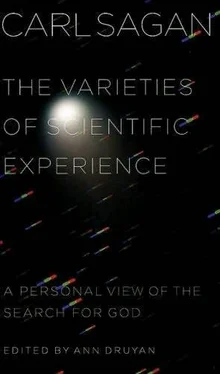We have Ten Commandments in the West. Why is there no commandment exhorting us to learn? "Thou shalt understand the world. Figure things out." There's nothing like that. And very few religions urge us to enhance our understanding of the natural world. I think it is striking how poorly religions, by and large, have accommodated to the astonishing truths that have emerged in the last few centuries.
Let's think together for a moment about the prevailing scientific wisdom on where we come from. The idea that nearly 15,000 million years ago the universe, or at least its present incarnation, was formed in the big bang; that for some 5,000 million years thereafter even the Milky Way Galaxy was not formed; that for some 5,000 million years after that, the Sun and the planets and the Earth were not formed; that 5,000 million years ago, on an Earth not identical by any means to the one we know today, a large-scale production of complex organic molecules occurred that led to a molecular system capable of self-replication, and therefore began the long, tortuous, and exquisitely beautiful evolutionary sequence that led from those first organisms, barely able to make vague copies of themselves, to the magnificent diversity and subtlety of life that graces our small planet today.
And we have grown up on this planet, trapped, in a certain sense, on it, not knowing of the existence of anything else beyond our immediate surroundings, having to figure the world out for ourselves. What a courageous and difficult enterprise, building, generation after generation, on what has been learned in the past; questioning the conventional wisdom; being willing, sometimes at great personal risk, to challenge the prevailing wisdom and gradually, slowly emerging from this torment, a well-based, in many senses predictive, quantitative understanding of the nature of the world around us. Not, by any means, understanding every aspect of that world but gradually, through successive approximations, understanding more and more. We face a difficult and uncertain future, and it seems to me it requires all of those talents that have been honed by our evolution and our history, if we are to survive.
One thing that seems especially striking in contemporary culture is how few benign visions of the immediate future are offered up. The mass media show all sorts of apocalyptic scenarios, ghastly futures. And there tends to be a kind of self-fulfilling prophecy to these prognostications. How rarely is it that we see a projection twenty or fifty or a hundred years into the future into a world in which we have come to our senses, in which we have figured things out? We can do that. There's nothing that says that we will inevitably fail to meet these challenges. We have solved more difficult problems, and many times. For example, there was once a doctrine called the divine right of kings. It held that God gave kings and queens the right to rule their people. And at that time it really meant rule. "Rule" was not so very different from "own." And eminent clergymen argued that this was clearly written in the Bible. It was the will of God. Eminent secular theologians, Thomas Hobbes, for example, argued just the same thing. And yet there was a stirring sequence of worldwide revolutions-the American, the French, the Russian, and a number of others-that have now produced a planet in which no one, except an occasional atavistic emperor of a short-lived, small country, no one believes in the divine right of kings. It's now a kind of embarrassment. It's something that our ancestors believed but we in this more enlightened time do not.
Or consider chattel slavery, which Aristotle argued was intended, it was in the natural order of things, the gods required it, that any movement to free the slaves was against divine intention. And slaveholders throughout history have pointed to passages in the Bible to justify the holding of slaves. Yet today, in another stirring sequence of events worldwide, legal chattel slavery has been essentially eliminated. And again it is something from our past that we are embarrassed about, that we surely should still think of as an important insight into a dark side of human nature that should be resisted. Surely the depredations visited on peoples who were once enslaved have not been balanced, but we have made remarkable progress.
Or look at the status of women, about which finally the planet is coming to its senses in our own time. Or even things like smallpox and other disfiguring and fatal diseases, diseases of children, that were once thought to be an inevitable, God-given part of life. The clergy argued, and some still do, that those diseases were sent by God as a scourge for mankind. Now there are no more cases of smallpox on the planet. For a few tens of millions of dollars and the efforts of physicians from a hundred countries, coordinated by the World Health Organization, smallpox has been removed from the planet Earth.
The vested interests in favor of the divine right of kings, or slavery, were very large. Kings had a vested interest in the divine right of kings. Slaveholders had a vested interest in the continuation of the institution of slavery. Who has a vested interest in the prospects of nuclear war? It's a very different situation. Everyone is vulnerable today. And therefore I think it's important to remember that we have dealt with and solved much more difficult problems than this.
The only problem is that the threat of nuclear war has to be dealt with swiftly, because the stakes are too high. The clock is ticking. We cannot permit a leisurely pace.
Suppose you are a linguist. You are interested in the nature and evolution of language. But unfortunately you know only one language. No matter how clever you are, no matter how complete your dictionary of whatever the language is-say, Nahuatl-you will be fundamentally limited in your ability to generate a broad, interdisciplinary, predictive theory of language. How could you be expected to do very well if you knew only one language? If Newton were restricted, in working through the theory of gravitation, to apples and forbidden to look at the motion of the Moon or the Earth, it is clear he would not have made much progress. It is precisely being able to look at the effects down here, look at the effects up there, comparing the two, which permits, encourages, the development of a broad and general theory. If we are stuck on one planet, if we know only this planet, then we are extremely limited in our understanding even of this planet. If we know only one kind of life, we are extremely limited in our understanding even of that kind of life. If we know only one kind of intelligence, we are extremely limited in knowing even that kind of intelligence. But seeking out our counterparts elsewhere, broadening our perspective, even if we do not find what we are looking for, gives us a framework in which to understand ourselves far better.
I think if we ever reach the point where we think we thoroughly understand who we are and where we came from, we will have failed. I think this search does not lead to a complacent satisfaction that we know the answer, not an arrogant sense that the answer is before us and we need do only one more experiment to find it out. It goes with a courageous intent to greet the universe as it really is, not to foist our emotional predispositions on it but to courageously accept what our explorations tell us.
After each lecture there was a lively question-and-answer period. Unfortunately, the transcripts report that in some cases the audience was not provided with working microphones. These are the fragments of the sessions that survive.
Questioner;When will we be likely to make contact with another intelligence?
CS:Prophecy is a lost art. But what I would say is that it's clear that if we don't try to seek such intelligence, it will be more difficult to find it. And it is remarkable that we live in a time when the technology permits us, at least in a halting way, to seek such intelligences, mainly by constructing large radio telescopes to listen for signals being sent to us-radio signals- by civilizations on planets of other stars.
Читать дальше










